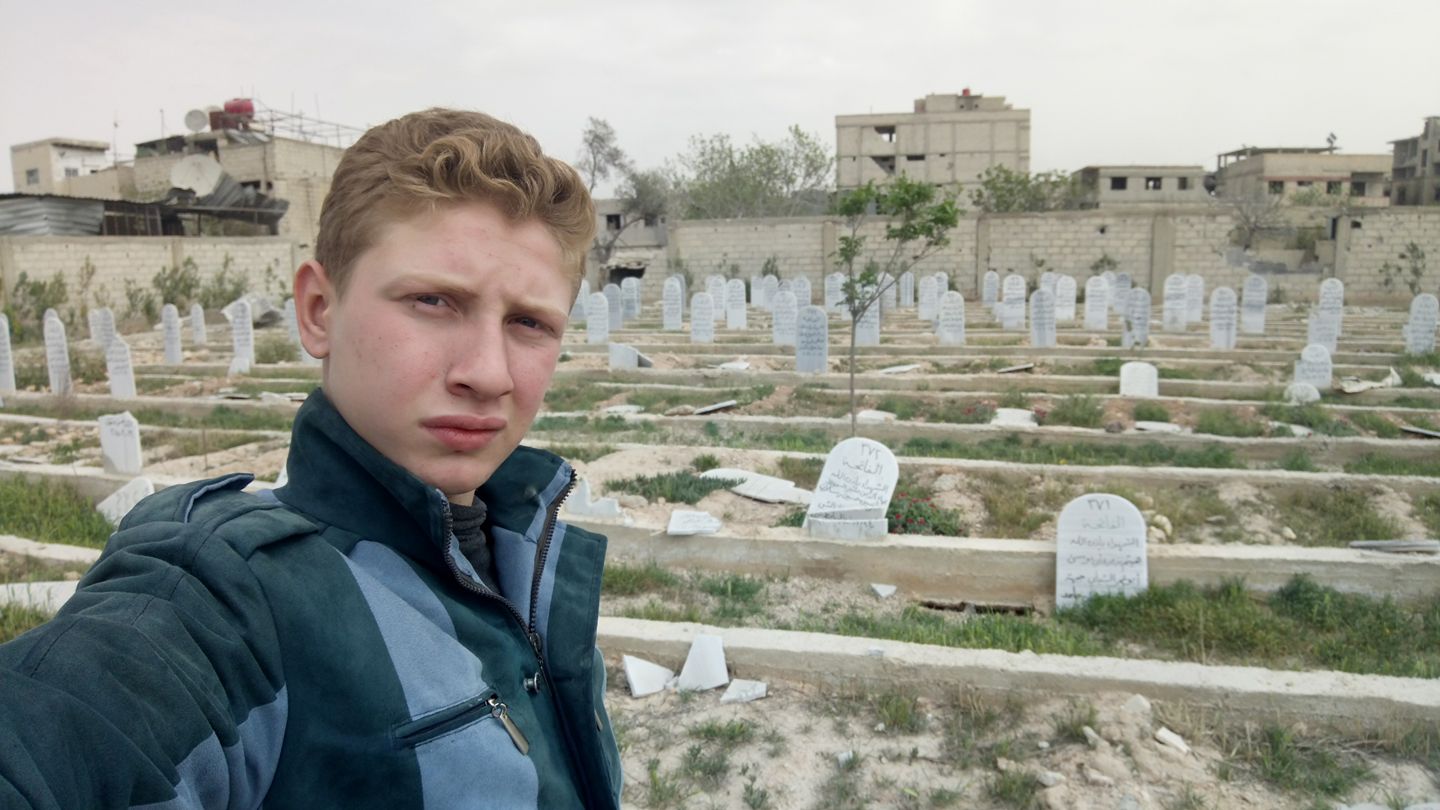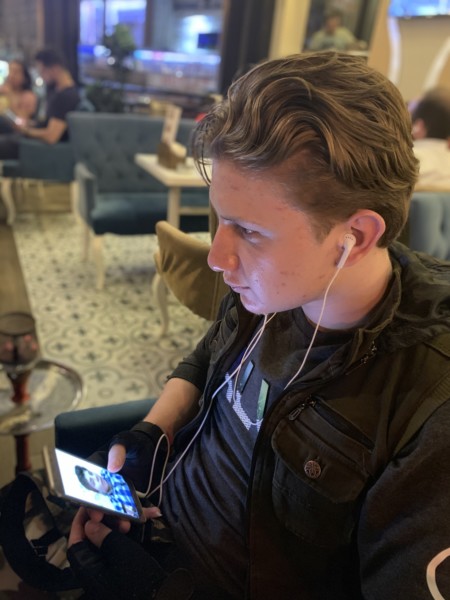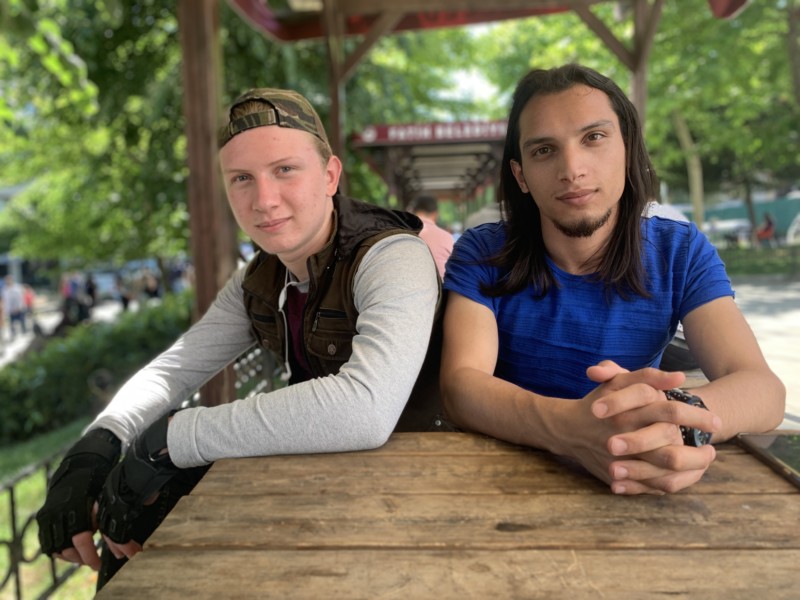Sign up for The Media Today, CJR’s daily newsletter.
Around Eastern Ghouta, a suburb of Damascus, Muhammad Najem, age 16, is known as the “Little Journalist.” He grew up there, in the village of Arbin, where conflict was a constant: In 2013, Bashar al-Assad, Syria’s president, launched a chemical-weapons attack on Eastern Ghouta that claimed more than 1,400 lives. One day in September 2015, Najem’s father was praying in the local mosque when a bomb dropped; he was killed in the strike. By December 2017, Assad’s regime and Russia, its ally, took the city in a “starve-and-surrender siege,” turning a region known for its ancient beauty and lush terrain into a graveyard of skeletons and bombed-out buildings. Staffan de Mistura, the United Nations special envoy for Syria, said that Eastern Ghouta represented the center of Syrian suffering. Najem felt a sense of urgency, he told me recently, to “get people in the West to know about the reality.”
Najem had witnessed horrific violence while persisting with childhood: He played soccer and foosball with friends. He had a pet parrot he taught to speak. He invented melodies on a small electric keyboard. His older brother Qusay Noor, a photojournalist, had become the head of the family when their father died, and when Noor went out on assignment, Najem wanted to follow. Their dad’s gravesite had been shelled multiple times; Noor photographed bones protruding from the rubble.
After the initial strikes in December 2017, Najem informed Noor and his other siblings that he wanted to tell their story. In a family meeting, all agreed that they would help Najem launch social-media accounts—Twitter, Facebook, Instagram—targeting an English-speaking audience. Noor would be the social-media manager, and their sister Hiba, a teacher and nurse, would help translate Najem’s reporting into an English script. They would post videos to YouTube.
In Najem’s inaugural video, recorded during the bombing campaign against Ghouta on December 7, he speaks in halting English while standing against a drab wall, taking a long breath after each sentence. “I will convey to you all the events which are being committed by the Assad regime in the Eastern Ghouta through my own social media: Facebook and Twitter,” he says. With his crystal-blue eyes, blond hair, and pale complexion, Najem defies typical Western assumptions about what an Arab should look like. (People from the western parts of Syria commonly have light skin and fair hair.) Yusuf Erim, a political analyst for the 24-hour Turkish news channel TRT World, describes Najem’s reporting style as “innocent and impartial.”
Over what would be a two-month campaign against Ghouta, Najem conducted interviews and documented the hopes of children, the bombing of buildings, life in the basements where Syrians huddled for safety, the sirens of makeshift ambulances driving to collect the injured, and the deaths of people close to him, including his best friend Salim’s sister. On those occasions when the shelling temporarily halted, his brothers raced to the rooftop of their home and, using a 3G router attached to a 10-meter Wi-Fi pole, uploaded Najem’s footage.
Najem would come to curate a YouTube account that offers a devastating inside look at the terror surrounding him. Some videos received thousands of views. One went viral, with the description “Listen and watch this terrible video During the bombing of the eastern Assad al-Ghouta by air Aircraft fall bombs and rockets from the #sky.” In another, set on his rooftop in Eastern Ghouta with fighter jets circling in the background, Najem pleads in broken English: “Bashar al-Assad, Putin, and Khomeini killed our childhood. Save us before it is too late.”
Najem’s videos didn’t gain attention immediately. For a while, his pleas went unheard, he said, as he witnessed death everywhere, in every corner—first his father, then his uncles. Then Nora Neus, a producer at CNN, found him. “Like most teenagers, 15-year-old Muhammad Najem spends a lot of time posting selfie videos on social media,” her story began. “Unlike most teenagers, Najem makes his videos in Syria as airstrikes rain bombs onto his street and kill his friends.” She also featured him on Anderson Cooper 360, during the broadcast of February 21, 2018. After that, his follower counts soared.
The new visibility was gratifying, though it also meant increased danger at home. A day after the CNN broadcast, Russia Today accused Najem of being a “crisis actor” and of working with a Hollywood director to create fake montages of air strikes.
Najem and his family and friends grew worried that the RT report had put a target on Najem’s back. Soon, his home was bombed. “I had a real fear for him, because shortly after the RT broadcast, his house was directly shelled, and you can tell it was targeted because it’s a small besieged zone,” Muhammad Idrees Ahmad, a lecturer on digital journalism at the University of Stirling in Scotland, said. Ahmad, who had been in touch with Noor and became a follower of Najem’s work, encouraged Najem to keep filming. “The dilemma was that without him, the world was indifferent.”
By March, Najem’s family was among the tens of thousands of people forcibly evacuated to the province of Idlib, on one of hundreds of bus convoys as part of “reconciliation deals” worked out by Russia, Turkey, and Syrian rebels. Upon his departure, Najem posted a farewell video, switching from English to his native Arabic. “We lost seven years,” he tells viewers. “My country. My father. My friend. My school. To go out to Idlib. Where are you, world? Thank you for your help. Where are the human rights?”
In Idlib, Najem turned his camera on kids his age, giving particular attention to disabled children, to let them tell their stories and ask for help in their own words. A young girl named Fatima, whom Najem met on the street, had lost one of her legs when a rocket hit her home city, Aleppo. She appeared on film asking for a prosthesis so she could play with friends; since then, she has received financial assistance from people who watched Najem’s video. The Turkish Red Crescent, a nonprofit that provides aid to Syrian refugees, also began responding to his subjects’ needs. When Najem posted a video of a young girl named Nur who had lost her hearing due to bombing, the Red Crescent delivered her a hearing aid, he told me.
Even as Najem’s videos made a difference, his happiness proved ephemeral. Air raids resumed, while his viewership and daily messages plummeted. By December 2018, his family was forced to make a difficult decision: stay or leave. Noor secured travel permits with the help of the Anadolu Agency, the Turkish state-run news company for which he had freelanced in the past. Najem, Noor, their mother, and their younger siblings decided to move to Turkey. But their sister Hiba, who was pregnant at the time, couldn’t join them. Noor has since attempted to reunite the family in Turkey, but the process has stalled for months.
Today, almost two years since Najem began posting videos before a backdrop of mortar shells and bombed-out buildings in Ghouta, it feels uncanny to see him alive, safe, and laughing in Istanbul. We meet at a café in the Fatih neighborhood, a historic district that is now home to many of the city’s 550,000-plus Syrians, where he has been living for eight months. He brings along Noor, who pulls a Winston from his pocket, lights it, and takes a drag. It’s his first cigarette of the day, he tells me; he had been awaiting the mosque’s sunset call to prayer to break his Ramadan fast. When I ask Najem if he smokes, too, he shakes his head no. “I started experiencing asthma after I breathed in some chemicals from the sarin gas attack in 2013,” he explains.
Najem, now a registered refugee, has not acclimated to life in Turkey. He is still not used to buildings being intact. He knows no more than 20 Turkish words. Unlike in Syria, where he studied by candlelight during electricity outages, here he is enrolled in English classes at a local education center but is often too distracted to concentrate. He stays glued to his phone day and night, barely sleeping, his mind occupied by news from Syria as he scrolls through WhatsApp and looks at photos of dead children being pulled from rubble. He barely leaves the house. Pointing to his stomach, he says, “This is why I’ve gained 20 kilos since I’ve arrived, even during Ramadan.”
When he needs to direct his brain away from the violence at home, Najem, ironically, turns to PlayerUnknown’s Battlegrounds, better known as PUBG, a multiplayer online battle game. Parachuting onto an island, he forages for weapons and tries to stay alive. He says that he plays less for the thrill, and more for the social opportunities. He’s met some nice female players. “He already fell in love with two girls and they now talk on Facebook,” Noor says, with gentle mockery.
Although he is among other Syrians, Najem has not found a sense of community in Istanbul. Part of the trouble, he says, stems from his strong sense that many Turks don’t want Syrians around. “There are so many of us here that if there is one bad guy, people generalize and blame all the problems on Syrians.”
His hope, against all odds, is to go back to Idlib. “In Syria, I had a purpose,” he tells me. “Here, I cannot be of any benefit.” To that end, Najem and Noor have applied for press credentials so they can travel as reporters. They say that the Turkish government will allow them to take a trip to Idlib during a major holiday, but the approval process is slow.
While they wait, Najem shares videos on his YouTube channel every few days from friends about the news in Idlib. But the frequency of his posting has declined. He’s not a reporter who picks up the phone and waits for footage to come in; Najem’s voice is that of a journalist-activist, one earnestly invested in the story he’s telling. “We cannot give up on our cause,” he tells me, “especially after all those martyrs who sacrificed their lives for this cause.” For Najem, that means returning home. “All I want is for my country to return to peace,” he says. “I just wanted to show the world what was happening.”
Header image: Muhammad Najem visits the tomb of his father one final time before being evacuated from Eastern Ghouta. March 24, 2018.
Has America ever needed a media defender more than now? Help us by joining CJR today.





